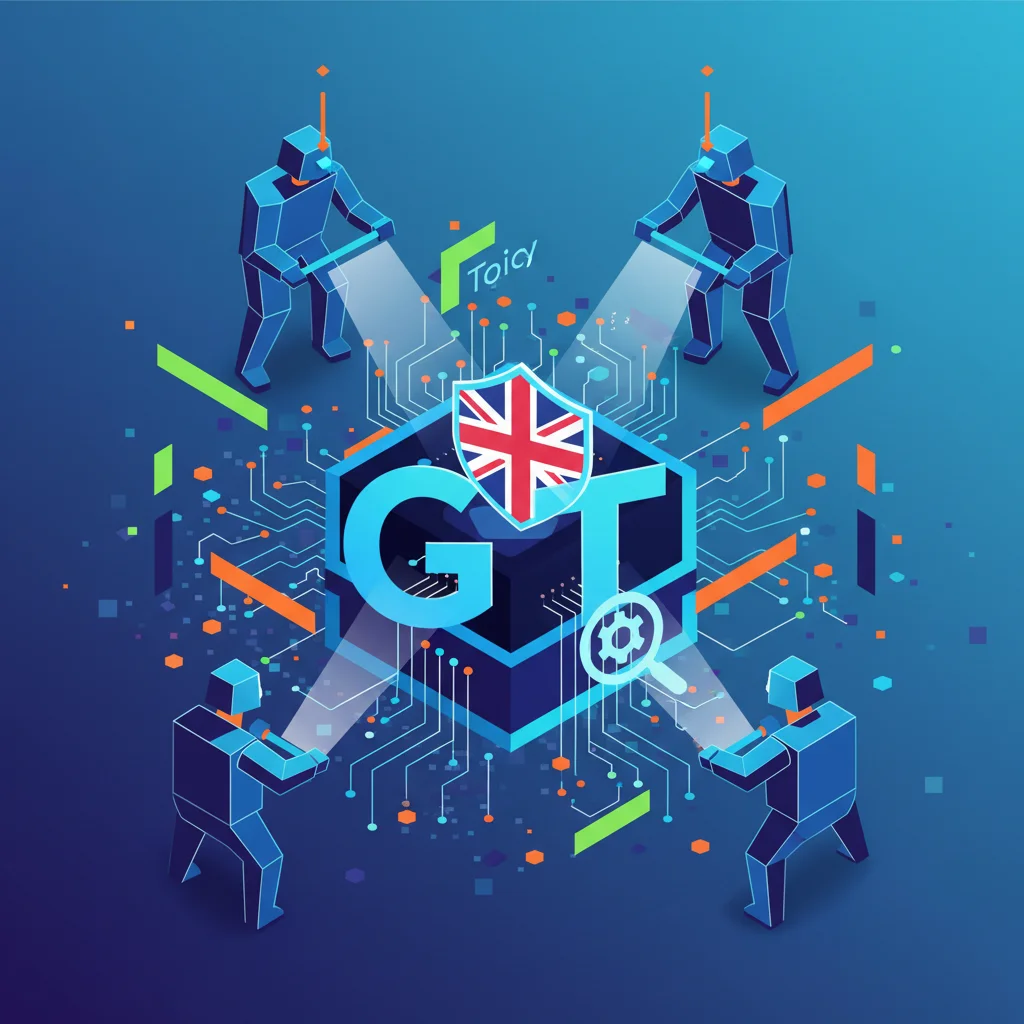
The Algorithm Police Are Here: Why the UK Is Auditing Big Tech’s AI
For years, the inner workings of the algorithms that power our digital lives have been a closely guarded secret, a “black box” accessible only to the tech giants who built them. These complex systems of artificial intelligence and machine learning decide what we see, what we read, and what we buy. But when it comes to protecting the most vulnerable users—children—that opacity is no longer acceptable. A new sheriff is in town, and they’re demanding to see the code.
The UK’s communications regulator, Ofcom, is gearing up to enforce the landmark Online Safety Act, a piece of legislation designed to hold tech companies accountable for the content on their platforms. And they’re not coming with suggestions; they’re coming with warrants for the digital age. In a clear signal to Silicon Valley, Ofcom’s chief executive, Melanie Dawes, has revealed she has already held meetings with major US AI firms, putting them on notice. The message is simple: the era of self-regulation is over. The algorithm police are here, and they’re ready to conduct audits.
This isn’t just another headline about regulation. It represents a fundamental shift in the relationship between government and technology, with profound implications for developers, startups, and the very future of digital innovation. So, what exactly does this mean, and why should everyone in the tech industry be paying close attention?
From Guidelines to Guardrails: The Power of the Online Safety Act
The Online Safety Act is the UK’s ambitious attempt to make the internet a safer place, particularly for children. For a long time, tech platforms have operated under a model of self-policing, creating their own community guidelines and content moderation policies. The results have been mixed at best, with harmful content frequently slipping through the cracks.
This Act changes the game by establishing a new regulatory framework with Ofcom at the helm. It imposes a legal “duty of care” on tech companies, legally obligating them to protect their users from illegal and harmful material. The legislation grants Ofcom significant new powers, including the ability to levy fines of up to £18 million or 10% of a company’s global annual turnover—a figure that could run into the billions for a company like Meta or Google.
But the most groundbreaking power is the one that strikes at the heart of Big Tech’s operations: the authority to demand information on how their algorithms work and, if necessary, to conduct full-scale audits. This is the technological equivalent of a financial audit, designed to uncover not monetary fraud, but risks to user safety embedded deep within the software.
Europe's Titans Assemble: Why Their New Space Alliance is a High-Stakes Bet on Software and AI
Demystifying the “Algorithm Audit”: What Does It Actually Mean?
When you hear “algorithm audit,” you might picture regulators poring over millions of lines of programming code. While that could be part of it, the reality is far more holistic. An audit isn’t just about the code; it’s about the entire system of automation that determines a user’s experience.
Ofcom will be asking critical questions:
- Data Inputs: What data is the AI trained on? Does this data contain biases that could lead to harmful outcomes?
- Model Logic: How does the machine learning model prioritize content? Is it optimized purely for engagement (likes, shares, watch time) at the expense of safety?
- Content Curation: How does the algorithm recommend content to users, especially children? Is it inadvertently creating “rabbit holes” that lead to extremist, self-harm, or eating disorder content?
- Risk Assessment: What steps has the company taken to identify and mitigate the risks their own technology creates? Can they prove they’ve done their due diligence?
Melanie Dawes made it clear that her focus is on understanding the “choices that are made by the platforms in the design of their services.” This is a direct challenge to the “move fast and break things” ethos that defined the last decade of tech development. Now, the mantra is shifting to “move carefully and protect people.”
The New Digital Supply Chain: Responsibilities for Everyone
This isn’t just a problem for the C-suite at Meta or TikTok. The ripple effects of the Online Safety Act will be felt across the entire tech ecosystem, from the largest cloud provider to the individual developer.
For Developers and Programmers
The concept of “Safety by Design” is now paramount. It’s no longer enough to write efficient code; you must write accountable code. This means meticulously documenting design choices, building systems that can be easily explained and audited, and considering the ethical implications of your work from the very first line of code. The demand for transparency will put pressure on development teams to move away from impenetrable “black box” models toward more interpretable AI systems.
For Startups and Entrepreneurs
For startups, this new landscape presents both a challenge and a massive opportunity. The challenge is the increased cost of compliance. Building a new social SaaS platform now requires a robust legal and ethical framework from day one, which can be a heavy lift for a small team. However, the opportunity is immense. Entrepreneurs who build tools for compliance, automation of risk assessments, ethical AI monitoring, and advanced cybersecurity for user data will find themselves in a booming market. This regulation is, in effect, creating an entirely new B2B sector.
Beyond the Code: Is the Tech Industry Creating Its Own Toxic Legacy?
Ofcom’s Powers at a Glance
To understand the gravity of the situation for tech companies, it’s helpful to see a clear breakdown of the new powers Ofcom will wield. These tools go far beyond a simple slap on the wrist.
| Ofcom’s Power | Description | Potential Impact on Tech Companies |
|---|---|---|
| Information Notices | The power to demand internal information about how services are run, including how algorithms work and what risk assessments have been conducted. | Forces companies to be transparent and organized. “We don’t know” is no longer an acceptable answer. |
| Algorithm Audits | The ability to enter company premises to test and audit the technology and algorithms used to deliver a service. | Requires companies to make their proprietary software and systems accessible and explainable to regulators. |
| Massive Fines | Power to fine companies up to £18 million or 10% of their global annual turnover, whichever is greater. | Creates a significant financial incentive for compliance, as penalties could reach billions of dollars. |
| Business Disruption Measures | The ability to require payment providers, advertisers, and internet service providers to withdraw services from a non-compliant platform. | An “economic death penalty” that can effectively shut down a service in the UK by cutting off its revenue and access. |
| Criminal Liability for Senior Managers | Senior managers can be held criminally liable if they fail to comply with Ofcom’s information requests or obstruct an investigation. | Ensures accountability rests with individuals at the top, not just the corporate entity. (source) |
The Global Ripple Effect: A New “London Effect”?
The world is watching. Much like the EU’s GDPR set a global standard for data privacy (the “Brussels Effect”), the UK’s Online Safety Act could establish a new benchmark for algorithmic accountability. Tech companies are global, and it’s often more efficient for them to adopt the strictest standard across all their markets rather than building different versions of their platforms for each region.
The UK is creating a blueprint for how a democracy can rein in the excesses of Big Tech without outright banning services. This approach, focused on risk assessment and system audits, is a sophisticated model that other nations may look to replicate. The meetings with US firms before the regulations are even fully in force show that Ofcom understands the global nature of this challenge. They are not just regulating UK companies; they are regulating any company that has users in the UK.
The AI Treadmill: Why Your Team's Skills Are Already Obsolete (And How to Fix It)
The Road Ahead: A More Responsible Digital Future
The implementation of the Online Safety Act marks the end of an era. The wild west days of the internet, where platforms could grow at all costs with little regard for the societal impact, are officially over in the UK. The demand for algorithmic transparency is a direct response to the real-world harm that opaque systems can cause.
For the tech industry, this is a moment of reckoning and adaptation. It will require a cultural shift towards prioritizing safety, ethics, and accountability as core components of innovation. The challenge is significant, but the goal is essential: to build a digital world that is not only powerful and engaging but also safe and trustworthy for everyone, especially the next generation.


